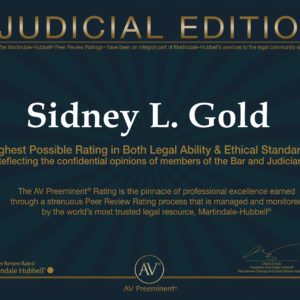Philadelphia Employment Contract Lawyers
What Should Employers Know about Employment Contracts?
Employment contracts are an essential part of any business, and they must be treated with the utmost care. When a business hires anyone from an executive to a junior salesperson, a contract should be involved. Even though both parties may believe the terms of the contract were agreed to verbally, a written contract serves as a safety net for both the employer and the employee.
Businesses must be aware of their responsibilities once someone has been hired, and the contract must always be upheld for fear that it could be nullified if the business is not faithful in its promises. At the same time, the employee needs a contract that explains what they do, how much they are paid, when they come to work, any benefits that are provided, legal remedies for both parties, and agreements that protect both the business and the employee.

Companies should reach out to an experienced employment lawyer for help writing these contracts, defending them, or adding addenda as needed. Business owners or managers should not attempt to write or execute a contract alone, as the language used in the contract is critical to the success of the contract and everyone’s understanding of its implications.
What Should an Employment Contract Include?
Every employment contract should include a few items that make it easy to understand and execute, including:
- The legal name of the employer and the employee
- The reporting location of the position
- The title of the direct supervisor
- A copy for both parties
The contract should always begin with the legal name of the business. This is important because legal action will be taken up by the corporation that owns or operates the business. For example, Pete’s Donuts might be owned and operated by Peter Crowley, LLC. Peter Crowley, LLC should be the name of the employer on the contract, as that company will be liable for all litigation relating to Pete’s Donuts.
The legal name of the employee is also important because employees may go by their middle names, a nickname, or even initials that do not align with their full legal name. If the business hires someone named Scott Allen Robinson, his name must be listed in this manner even though he goes by Allen. Any legal action will be taken up in his full legal name, his bank account might have his full name, and he may receive training or certifications through the business under his full legal name.
The same is true if the business hires someone named A.J. Thompson. The employee might go by A.J., but his full legal name may be Alfred Charles Thompson. This can cause confusion unless the employee’s full legal name is listed on the contract.
Nicknames can also cause confusion because the nickname of the employee is likely nothing like their full legal name. A man named David Arthur Jones, for example, might go by Scooter, but that name has likely never been used in legal documents.
The reporting location for the employee must be listed especially when the corporation has multiple locations or allows the employee to work from home. Someone who works remotely can be listed as a remote employee or have no reporting location. Peter Crowley, LLC might assign the employee to Pete’s Donuts store number two. This distinction provides clarity for the employee and the business.
If that employee is promoted to a management position at another store, their contract can be amended to reflect their new reporting location.
Each contract should list the title of the direct supervisor. For example, the Director of Sales for a large corporation likely reports to the Chief Financial Officer. Listing the chain of command in the contract helps avoid confusion.
Once the contract has been signed, both parties must receive a copy for their records. An employment lawyer can be of assistance in writing, signing, and disseminating copies of a contract for every new hire.
What Are the Terms of Employment?
 When a contract is signed, the contract should include the duration of employment and any additional information that is relevant to the position. A contract for someone who will work only for six months should state that the contract expires six months after signing. The dates should be clearly listed on the contract to provide clarity for the employee and the employer.
When a contract is signed, the contract should include the duration of employment and any additional information that is relevant to the position. A contract for someone who will work only for six months should state that the contract expires six months after signing. The dates should be clearly listed on the contract to provide clarity for the employee and the employer.
If the contract includes opportunities for advancement, those options should be listed. Someone who starts as a manager trainee must have a contract that says they will be promoted to full managerial status after a certain amount of time. If the employer does not specify, the employee could be upset if they are not promoted or even file a claim for damages because they believe the contract was violated.
The contract must also include the title given to the employee. Although titles are often formalities, they must be used when creating a chain of command or expecting someone to handle certain duties. For example, an employee in the finance department should have a title that includes finance. If the employee is ever asked to work outside of that department, they can show that they were not hired to work outside their field. Not only do job titles clarify how the business operates, but also customers benefit because they know who to contact when they need assistance.
Job titles also show where promotion opportunities are available. For example, a law firm should start new attorneys as Junior Associates. Those lawyers can rise to the rank of Senior Associate, Partner, and even Managing Partner. Without a clear hierarchy, the business seems to be disorganized and employees often believe they have no upward mobility. The company could lose talented employees purely because job titles are not written properly.
Other distinctions include the role of an adjunct professor, consultant, or Of Counsel attorney. These job titles indicate that the company is not the primary employer for the employee, but the two have come together because the employee provides a special service the business needs.
Companies can speak to an employment lawyer when listing job titles, writing the terms of employment, and providing a chain of command for employees to follow.
What Are the Job Duties?
 Job duties should be clearly defined in an employment contract so that the business runs smoothly. Everyone can read what they are expected to do, and they can limit their work to those job duties instead of working outside their intended responsibilities.
Job duties should be clearly defined in an employment contract so that the business runs smoothly. Everyone can read what they are expected to do, and they can limit their work to those job duties instead of working outside their intended responsibilities.
The list of job duties on each contract will naturally rise in number and/or importance as an employee is promoted. Employees come to understand what everyone does, and all those working for the company will come to understand what is expected if they are promoted. Additionally, consultants, adjuncts, and other external employees often have fewer job duties.
Job duties also help employees understand to whom they report. For example, the Director of Marketing reports their marketing efforts to the Director of Sales, but they also report their daily operations to an Executive Vice President. Explaining job duties allows employees to work independently without repeatedly turning to a supervisor for guidance.
Working with an employment lawyer on an employment contract allows employees to learn more about their job duties, to whom they report, and how they can advance through the company. Some job titles may also appeal to employees who plan to retire, want more career options, or wish to reduce their workload.
Should Companies List the Salary or Hourly Pay?
 Hourly pay or a yearly salary should be listed on the contract. The employee needs to know how many hours they are expected to work, which days they are expected to report, and holidays during which the office is closed. Employees also need to know if they are eligible for overtime pay. Overtime pay should equal 1.5 times the regular hourly rate for the employee when they work more than 40 hours a week in both New Jersey and Pennsylvania. Overtime does not apply to those who work more than eight hours in a day.
Hourly pay or a yearly salary should be listed on the contract. The employee needs to know how many hours they are expected to work, which days they are expected to report, and holidays during which the office is closed. Employees also need to know if they are eligible for overtime pay. Overtime pay should equal 1.5 times the regular hourly rate for the employee when they work more than 40 hours a week in both New Jersey and Pennsylvania. Overtime does not apply to those who work more than eight hours in a day.
Employees must also know if they are employees or independent contractors. An employee who is paid hourly can generally collect overtime, whereas an independent contractor cannot receive overtime pay. Clarifying this situation for the employee helps avoid confusion when employees are paid. Additionally, an hourly employee qualifies for Workers’ Compensation coverage, whereas an independent contractor does not qualify.
Benefits such as health insurance, dental insurance, and life insurance may be added into the contract. In addition, compensation such as a car or housing allowance can be listed, but each benefit must have a line item that is easy to read and understand.
If the company needs to know who is eligible for overtime, how employees should be paid, or how benefits should be listed, they should confer with an employment lawyer to review each contract.
Should Companies Mention At-Will Employment in an Employee Contract?
 Although New Jersey is an at-will employment state, it helps to include at-will employment in the contract. In short, the employee can walk away from their contract at any time, and they must understand the business can terminate the contract at any time.
Although New Jersey is an at-will employment state, it helps to include at-will employment in the contract. In short, the employee can walk away from their contract at any time, and they must understand the business can terminate the contract at any time.
Although a business might list grounds for termination or guidelines for behavior on the job, the business must explain that these guidelines do not eliminate the at-will employment status of its employees.
Businesses may get in trouble when they take at-will employment too far.
At-will employment allows employees to leave without penalty, but employers can terminate contracts only when that termination does not violate federal or state laws against discrimination. If an employee believes that their at-will employment status has been violated because of discrimination, they may file a complaint and request damages.
Companies should work with an employment lawyer when an employment contract requires specific language concerning at-will employment.
Should Companies Choose Specific Legal Remedies for the Contract?
Employment contracts often explain legal remedies that the company would like to use in the event of a dispute. Union employees often do not have these clauses in their contracts because union lawyers will represent them. In any other employment contract, the corporation will ask for independent arbitration, mediation, or some other form of conflict resolution that does not involve going to court.
An employment lawyer can be consulted about how to mandate specific legal remedies for each contract. At times, it makes sense for the employer to go to court because the employer may have leaked trade secrets or violated an addendum to the contract. Customized contracts are often the best way for the business to protect itself after recruiting each new hire.
Should an Employee Manual Be Added?
 Employee manuals can be added to any contract or provided when the contract is signed. The contract might have an addendum the employee signs stating that they have read and understood the manual. The manual likely should not have an impact on the contract because the terms of the contract are legally binding once it has been signed.
Employee manuals can be added to any contract or provided when the contract is signed. The contract might have an addendum the employee signs stating that they have read and understood the manual. The manual likely should not have an impact on the contract because the terms of the contract are legally binding once it has been signed.
If the manual is written improperly or does not defer to the contract, the employee could be confused. This confusion might also lead to a settlement or judgement against the employer. The employee manual provides guidelines for employees, but it might contradict the contract in some instances. Therefore, the manual should state that the employment contract controls the rights for both parties.
An employment lawyer can advise companies how to use employment contracts and manuals to properly train or inform everyone on the staff.
What Are Non-Disclosure, Non-Compete, and Non-Disparagement Agreements?
Businesses often add non-disclosure, non-compete, non-disparagement, or trade secret agreements to their contracts. These agreements are specific to each business depending on the sort of information to which employees are privy or clients they served who are vital to the company’s success.
A non-disclosure agreement often covers trade secrets and project information that would unfairly harm the company if that data were revealed publicly. These agreements might also ask the employee to leave behind documents that were compiled while working with the corporation. For example, a company that is working on a machine for manufacturing a particular product might not have patented or trademarked the design.
If the business wants to patent or trademark a design, the business should have an addendum in each contract that states the business owns these patents or trademarks because its time, money, and resources were used during the development process. Although employees may believe these designs belong to them, the contract between the employer and employee should explain the rights, if any, employees have to these trademarks or patents.
A non-compete clause can be added to the contract to prevent the employee from working for a direct competitor shortly after terminating their contract. The employer must choose a duration for the non-compete agreement along with a geographic area. Shorter agreements are often easier to enforce, and longer agreements may be considered excessive. Some employees might not sign their contracts if the non-compete agreement looks to be inappropriately restrictive.
The geographic area of the non-compete agreement must also be reasonable. If an engineer leaves a company in Philadelphia for a company in Wilmington, Delaware, it is fair to say those companies are competing for many of the same clients. That engineer, however, should be allowed to move to Baltimore, Washington, New York, or Boston because those cities do not have the same clients as Philadelphia does. A non-solicitation agreement may also be used to prevent the employee from stealing clients from their old employer.
Finally, a non-disparagement agreement may be used to prevent an employee from speaking negatively about the business after leaving. This agreement can include the following:
- Speaking negatively about the business to the press
- Speaking negatively about the business to current recruits
- Writing negative online reviews of the business
Companies should ask a Philadelphia employment lawyer for help adding non-compete, non-disparagement, or non-disclosure agreements and agreements concerning the ownership of trade secrets, patents, or trademarks. These agreements must be reasonable if the business plans to defend them in court. Additionally, the business must be reasonable because the best talent will not sign contracts with overly restrictive or aggressive language.
Philadelphia Employment Lawyers at Sidney L. Gold & Associates, P.C. Help Businesses with Employment Contracts
Speak to the Philadelphia employment lawyers at Sidney L. Gold & Associates, P.C. when you have questions about employment contracts or agreements that impact your business. Our employment attorneys have earned a reputation that makes us one of the most highly recommended employment law firms in both Pennsylvania and New Jersey. Call us today at 215-569-1999 or contact us online for a free consultation.































